Report on Entrepreneurship and Small Business Management - Module 9
VerifiedAdded on 2023/01/12
|17
|4621
|21
Report
AI Summary
This report delves into the core concepts of entrepreneurship and small business management. It begins by defining entrepreneurship, entrepreneurial activity, and enterprise, differentiating between various types of entrepreneurs and business structures, including lifestyle and growth firms, and social enterprises. The report explores the sources of entrepreneurial ideas, the role of creativity and innovation, and how businesses protect intellectual property rights. It assesses the impact of small businesses on the economy, considering factors like size, turnover, and growth. The report also examines the international aspects of entrepreneurship and the key aspects of an entrepreneurial mindset, including characteristics, skills, and factors influencing business start-up decisions. The report concludes with an overview of the risks and rewards associated with starting a business.
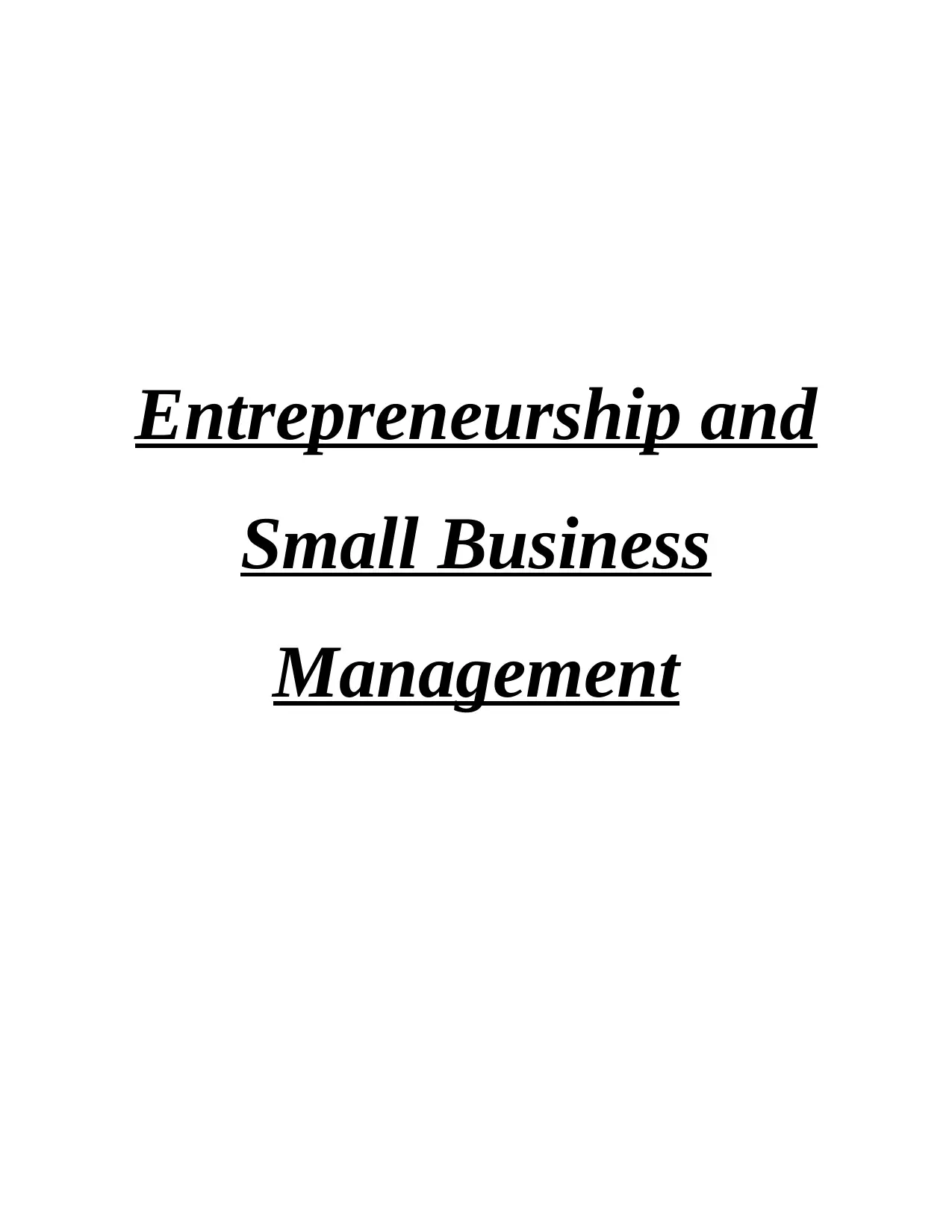
Entrepreneurship and
Small Business
Management
Small Business
Management
Paraphrase This Document
Need a fresh take? Get an instant paraphrase of this document with our AI Paraphraser
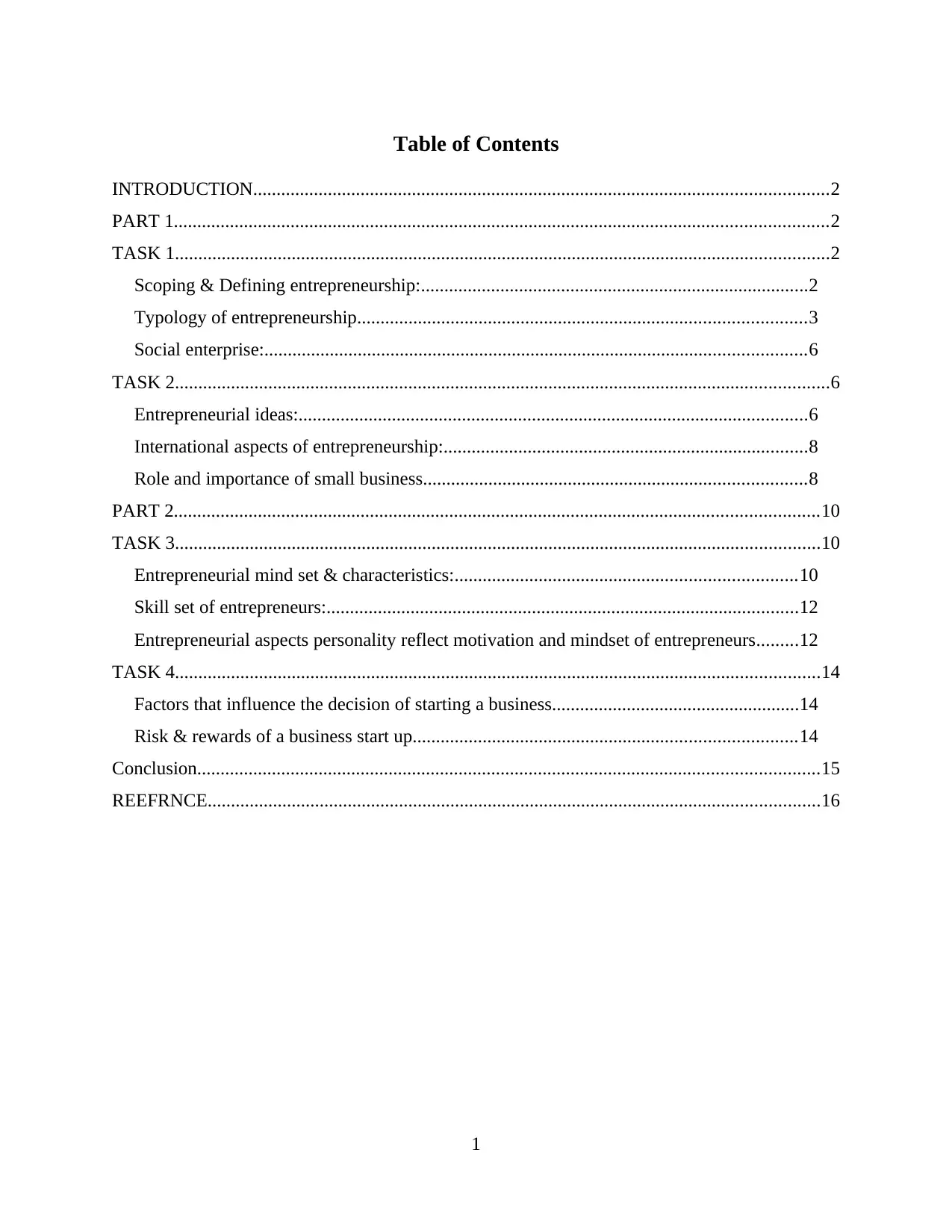
Table of Contents
INTRODUCTION...........................................................................................................................2
PART 1............................................................................................................................................2
TASK 1............................................................................................................................................2
Scoping & Defining entrepreneurship:...................................................................................2
Typology of entrepreneurship................................................................................................3
Social enterprise:....................................................................................................................6
TASK 2............................................................................................................................................6
Entrepreneurial ideas:.............................................................................................................6
International aspects of entrepreneurship:..............................................................................8
Role and importance of small business..................................................................................8
PART 2..........................................................................................................................................10
TASK 3..........................................................................................................................................10
Entrepreneurial mind set & characteristics:.........................................................................10
Skill set of entrepreneurs:.....................................................................................................12
Entrepreneurial aspects personality reflect motivation and mindset of entrepreneurs.........12
TASK 4..........................................................................................................................................14
Factors that influence the decision of starting a business.....................................................14
Risk & rewards of a business start up..................................................................................14
Conclusion.....................................................................................................................................15
REEFRNCE...................................................................................................................................16
1
INTRODUCTION...........................................................................................................................2
PART 1............................................................................................................................................2
TASK 1............................................................................................................................................2
Scoping & Defining entrepreneurship:...................................................................................2
Typology of entrepreneurship................................................................................................3
Social enterprise:....................................................................................................................6
TASK 2............................................................................................................................................6
Entrepreneurial ideas:.............................................................................................................6
International aspects of entrepreneurship:..............................................................................8
Role and importance of small business..................................................................................8
PART 2..........................................................................................................................................10
TASK 3..........................................................................................................................................10
Entrepreneurial mind set & characteristics:.........................................................................10
Skill set of entrepreneurs:.....................................................................................................12
Entrepreneurial aspects personality reflect motivation and mindset of entrepreneurs.........12
TASK 4..........................................................................................................................................14
Factors that influence the decision of starting a business.....................................................14
Risk & rewards of a business start up..................................................................................14
Conclusion.....................................................................................................................................15
REEFRNCE...................................................................................................................................16
1
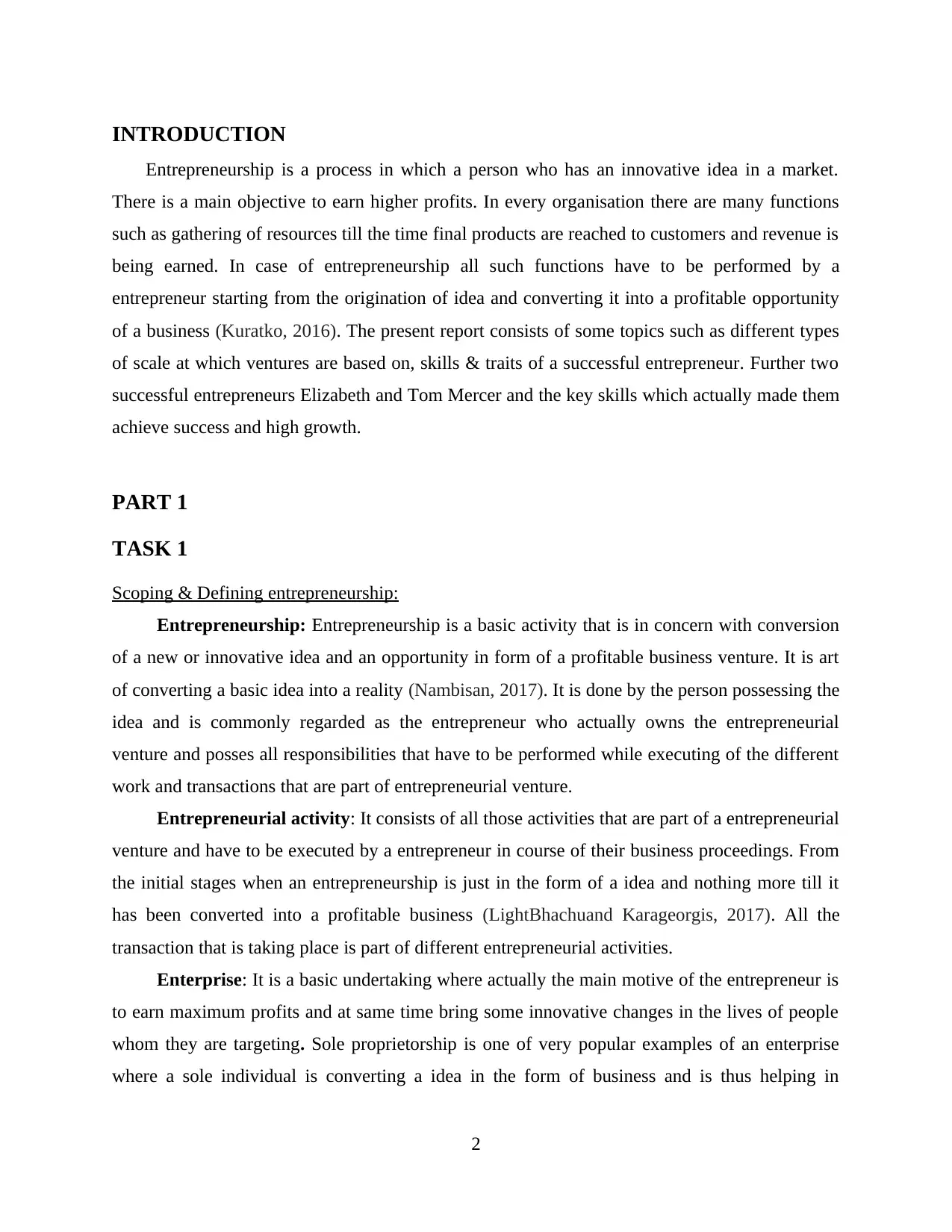
INTRODUCTION
Entrepreneurship is a process in which a person who has an innovative idea in a market.
There is a main objective to earn higher profits. In every organisation there are many functions
such as gathering of resources till the time final products are reached to customers and revenue is
being earned. In case of entrepreneurship all such functions have to be performed by a
entrepreneur starting from the origination of idea and converting it into a profitable opportunity
of a business (Kuratko, 2016). The present report consists of some topics such as different types
of scale at which ventures are based on, skills & traits of a successful entrepreneur. Further two
successful entrepreneurs Elizabeth and Tom Mercer and the key skills which actually made them
achieve success and high growth.
PART 1
TASK 1
Scoping & Defining entrepreneurship:
Entrepreneurship: Entrepreneurship is a basic activity that is in concern with conversion
of a new or innovative idea and an opportunity in form of a profitable business venture. It is art
of converting a basic idea into a reality (Nambisan, 2017). It is done by the person possessing the
idea and is commonly regarded as the entrepreneur who actually owns the entrepreneurial
venture and posses all responsibilities that have to be performed while executing of the different
work and transactions that are part of entrepreneurial venture.
Entrepreneurial activity: It consists of all those activities that are part of a entrepreneurial
venture and have to be executed by a entrepreneur in course of their business proceedings. From
the initial stages when an entrepreneurship is just in the form of a idea and nothing more till it
has been converted into a profitable business (LightBhachuand Karageorgis, 2017). All the
transaction that is taking place is part of different entrepreneurial activities.
Enterprise: It is a basic undertaking where actually the main motive of the entrepreneur is
to earn maximum profits and at same time bring some innovative changes in the lives of people
whom they are targeting. Sole proprietorship is one of very popular examples of an enterprise
where a sole individual is converting a idea in the form of business and is thus helping in
2
Entrepreneurship is a process in which a person who has an innovative idea in a market.
There is a main objective to earn higher profits. In every organisation there are many functions
such as gathering of resources till the time final products are reached to customers and revenue is
being earned. In case of entrepreneurship all such functions have to be performed by a
entrepreneur starting from the origination of idea and converting it into a profitable opportunity
of a business (Kuratko, 2016). The present report consists of some topics such as different types
of scale at which ventures are based on, skills & traits of a successful entrepreneur. Further two
successful entrepreneurs Elizabeth and Tom Mercer and the key skills which actually made them
achieve success and high growth.
PART 1
TASK 1
Scoping & Defining entrepreneurship:
Entrepreneurship: Entrepreneurship is a basic activity that is in concern with conversion
of a new or innovative idea and an opportunity in form of a profitable business venture. It is art
of converting a basic idea into a reality (Nambisan, 2017). It is done by the person possessing the
idea and is commonly regarded as the entrepreneur who actually owns the entrepreneurial
venture and posses all responsibilities that have to be performed while executing of the different
work and transactions that are part of entrepreneurial venture.
Entrepreneurial activity: It consists of all those activities that are part of a entrepreneurial
venture and have to be executed by a entrepreneur in course of their business proceedings. From
the initial stages when an entrepreneurship is just in the form of a idea and nothing more till it
has been converted into a profitable business (LightBhachuand Karageorgis, 2017). All the
transaction that is taking place is part of different entrepreneurial activities.
Enterprise: It is a basic undertaking where actually the main motive of the entrepreneur is
to earn maximum profits and at same time bring some innovative changes in the lives of people
whom they are targeting. Sole proprietorship is one of very popular examples of an enterprise
where a sole individual is converting a idea in the form of business and is thus helping in
2
⊘ This is a preview!⊘
Do you want full access?
Subscribe today to unlock all pages.

Trusted by 1+ million students worldwide
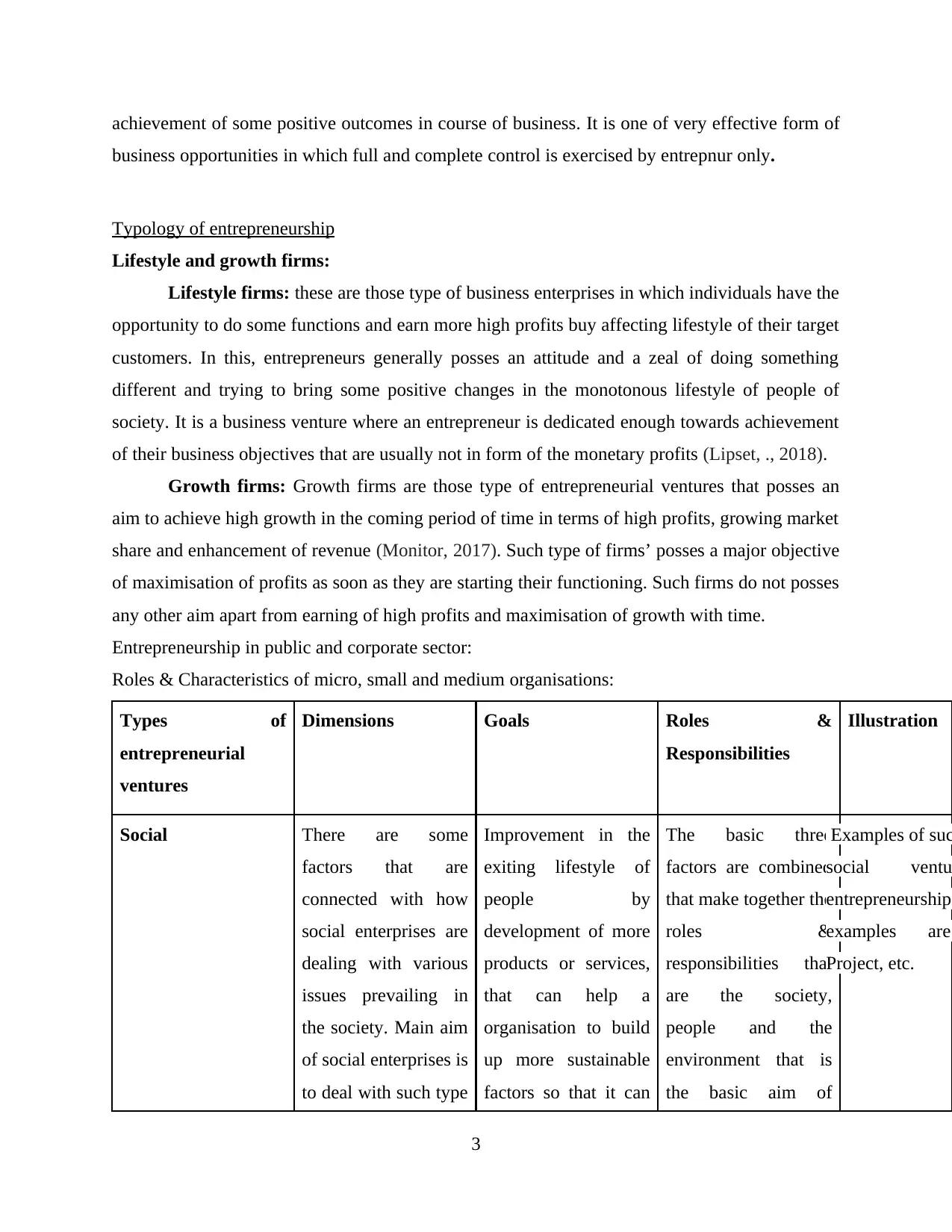
achievement of some positive outcomes in course of business. It is one of very effective form of
business opportunities in which full and complete control is exercised by entrepnur only.
Typology of entrepreneurship
Lifestyle and growth firms:
Lifestyle firms: these are those type of business enterprises in which individuals have the
opportunity to do some functions and earn more high profits buy affecting lifestyle of their target
customers. In this, entrepreneurs generally posses an attitude and a zeal of doing something
different and trying to bring some positive changes in the monotonous lifestyle of people of
society. It is a business venture where an entrepreneur is dedicated enough towards achievement
of their business objectives that are usually not in form of the monetary profits (Lipset, ., 2018).
Growth firms: Growth firms are those type of entrepreneurial ventures that posses an
aim to achieve high growth in the coming period of time in terms of high profits, growing market
share and enhancement of revenue (Monitor, 2017). Such type of firms’ posses a major objective
of maximisation of profits as soon as they are starting their functioning. Such firms do not posses
any other aim apart from earning of high profits and maximisation of growth with time.
Entrepreneurship in public and corporate sector:
Roles & Characteristics of micro, small and medium organisations:
Types of
entrepreneurial
ventures
Dimensions Goals Roles &
Responsibilities
Illustration
Social There are some
factors that are
connected with how
social enterprises are
dealing with various
issues prevailing in
the society. Main aim
of social enterprises is
to deal with such type
Improvement in the
exiting lifestyle of
people by
development of more
products or services,
that can help a
organisation to build
up more sustainable
factors so that it can
The basic three
factors are combined
that make together the
roles &
responsibilities that
are the society,
people and the
environment that is
the basic aim of
Examples of suc
social ventu
entrepreneurship
examples are
Project, etc.
3
business opportunities in which full and complete control is exercised by entrepnur only.
Typology of entrepreneurship
Lifestyle and growth firms:
Lifestyle firms: these are those type of business enterprises in which individuals have the
opportunity to do some functions and earn more high profits buy affecting lifestyle of their target
customers. In this, entrepreneurs generally posses an attitude and a zeal of doing something
different and trying to bring some positive changes in the monotonous lifestyle of people of
society. It is a business venture where an entrepreneur is dedicated enough towards achievement
of their business objectives that are usually not in form of the monetary profits (Lipset, ., 2018).
Growth firms: Growth firms are those type of entrepreneurial ventures that posses an
aim to achieve high growth in the coming period of time in terms of high profits, growing market
share and enhancement of revenue (Monitor, 2017). Such type of firms’ posses a major objective
of maximisation of profits as soon as they are starting their functioning. Such firms do not posses
any other aim apart from earning of high profits and maximisation of growth with time.
Entrepreneurship in public and corporate sector:
Roles & Characteristics of micro, small and medium organisations:
Types of
entrepreneurial
ventures
Dimensions Goals Roles &
Responsibilities
Illustration
Social There are some
factors that are
connected with how
social enterprises are
dealing with various
issues prevailing in
the society. Main aim
of social enterprises is
to deal with such type
Improvement in the
exiting lifestyle of
people by
development of more
products or services,
that can help a
organisation to build
up more sustainable
factors so that it can
The basic three
factors are combined
that make together the
roles &
responsibilities that
are the society,
people and the
environment that is
the basic aim of
Examples of suc
social ventu
entrepreneurship
examples are
Project, etc.
3
Paraphrase This Document
Need a fresh take? Get an instant paraphrase of this document with our AI Paraphraser
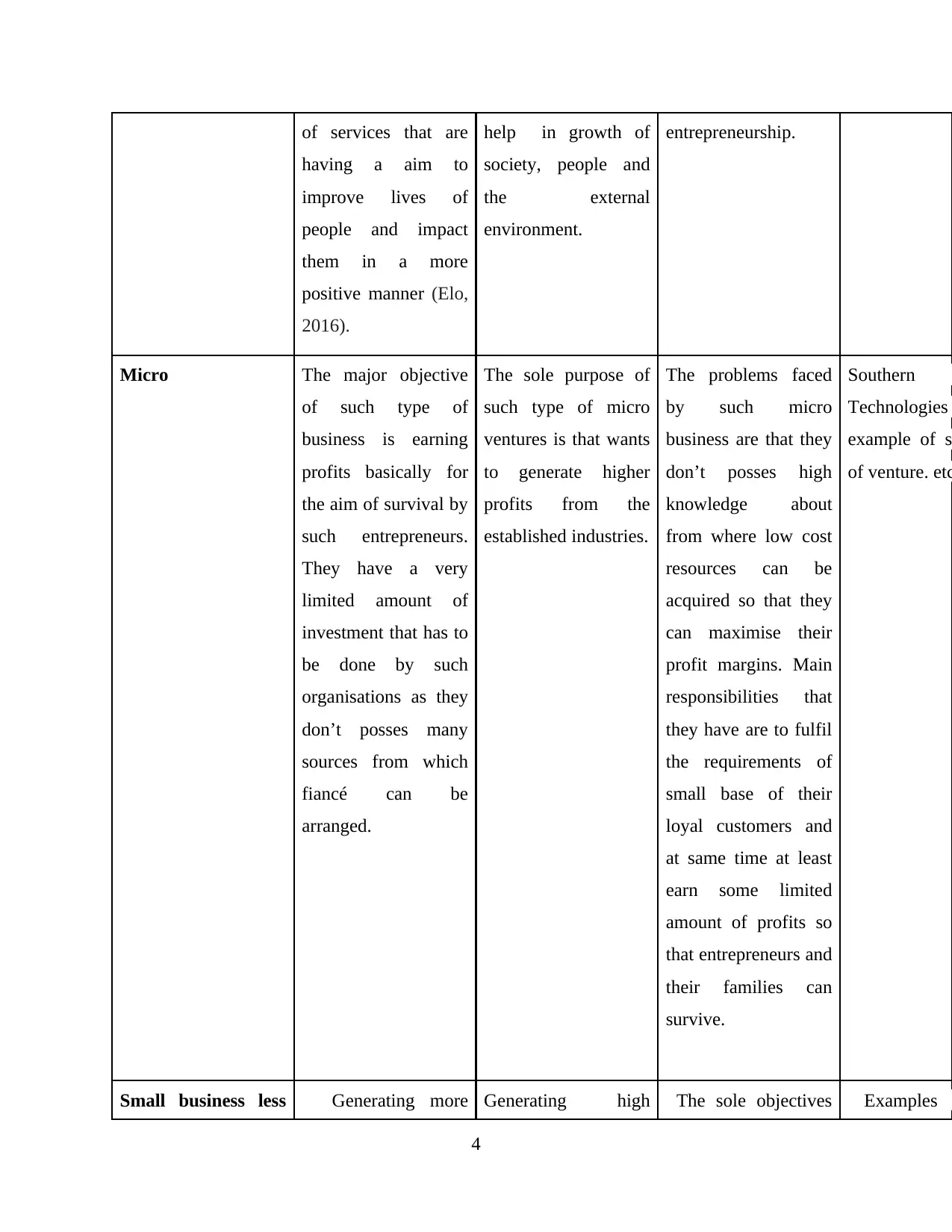
of services that are
having a aim to
improve lives of
people and impact
them in a more
positive manner (Elo,
2016).
help in growth of
society, people and
the external
environment.
entrepreneurship.
Micro The major objective
of such type of
business is earning
profits basically for
the aim of survival by
such entrepreneurs.
They have a very
limited amount of
investment that has to
be done by such
organisations as they
don’t posses many
sources from which
fiancé can be
arranged.
The sole purpose of
such type of micro
ventures is that wants
to generate higher
profits from the
established industries.
The problems faced
by such micro
business are that they
don’t posses high
knowledge about
from where low cost
resources can be
acquired so that they
can maximise their
profit margins. Main
responsibilities that
they have are to fulfil
the requirements of
small base of their
loyal customers and
at same time at least
earn some limited
amount of profits so
that entrepreneurs and
their families can
survive.
Southern
Technologies
example of s
of venture. etc
Small business less Generating more Generating high The sole objectives Examples
4
having a aim to
improve lives of
people and impact
them in a more
positive manner (Elo,
2016).
help in growth of
society, people and
the external
environment.
entrepreneurship.
Micro The major objective
of such type of
business is earning
profits basically for
the aim of survival by
such entrepreneurs.
They have a very
limited amount of
investment that has to
be done by such
organisations as they
don’t posses many
sources from which
fiancé can be
arranged.
The sole purpose of
such type of micro
ventures is that wants
to generate higher
profits from the
established industries.
The problems faced
by such micro
business are that they
don’t posses high
knowledge about
from where low cost
resources can be
acquired so that they
can maximise their
profit margins. Main
responsibilities that
they have are to fulfil
the requirements of
small base of their
loyal customers and
at same time at least
earn some limited
amount of profits so
that entrepreneurs and
their families can
survive.
Southern
Technologies
example of s
of venture. etc
Small business less Generating more Generating high The sole objectives Examples
4
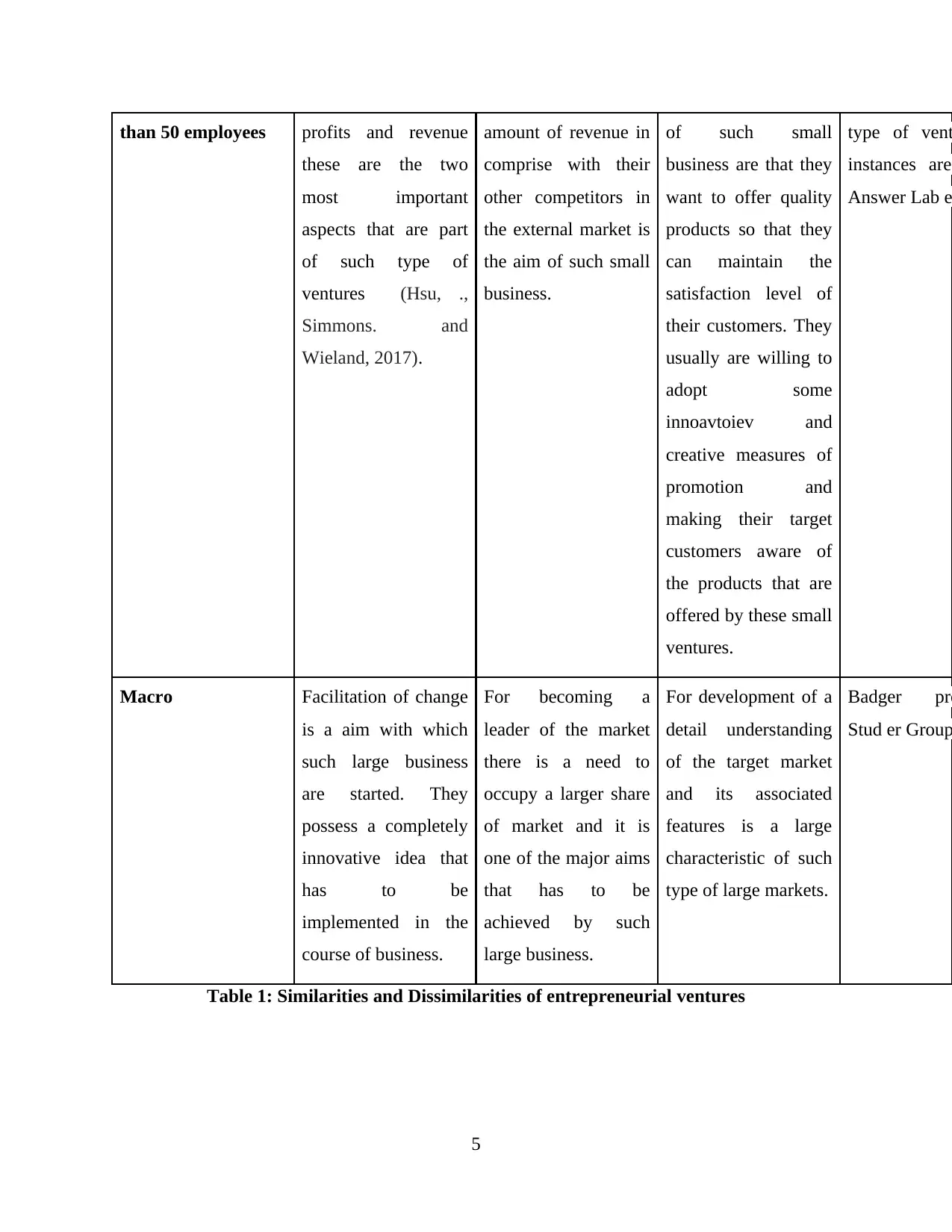
than 50 employees profits and revenue
these are the two
most important
aspects that are part
of such type of
ventures (Hsu, .,
Simmons. and
Wieland, 2017).
amount of revenue in
comprise with their
other competitors in
the external market is
the aim of such small
business.
of such small
business are that they
want to offer quality
products so that they
can maintain the
satisfaction level of
their customers. They
usually are willing to
adopt some
innoavtoiev and
creative measures of
promotion and
making their target
customers aware of
the products that are
offered by these small
ventures.
type of vent
instances are
Answer Lab e
Macro Facilitation of change
is a aim with which
such large business
are started. They
possess a completely
innovative idea that
has to be
implemented in the
course of business.
For becoming a
leader of the market
there is a need to
occupy a larger share
of market and it is
one of the major aims
that has to be
achieved by such
large business.
For development of a
detail understanding
of the target market
and its associated
features is a large
characteristic of such
type of large markets.
Badger pro
Stud er Group
Table 1: Similarities and Dissimilarities of entrepreneurial ventures
5
these are the two
most important
aspects that are part
of such type of
ventures (Hsu, .,
Simmons. and
Wieland, 2017).
amount of revenue in
comprise with their
other competitors in
the external market is
the aim of such small
business.
of such small
business are that they
want to offer quality
products so that they
can maintain the
satisfaction level of
their customers. They
usually are willing to
adopt some
innoavtoiev and
creative measures of
promotion and
making their target
customers aware of
the products that are
offered by these small
ventures.
type of vent
instances are
Answer Lab e
Macro Facilitation of change
is a aim with which
such large business
are started. They
possess a completely
innovative idea that
has to be
implemented in the
course of business.
For becoming a
leader of the market
there is a need to
occupy a larger share
of market and it is
one of the major aims
that has to be
achieved by such
large business.
For development of a
detail understanding
of the target market
and its associated
features is a large
characteristic of such
type of large markets.
Badger pro
Stud er Group
Table 1: Similarities and Dissimilarities of entrepreneurial ventures
5
⊘ This is a preview!⊘
Do you want full access?
Subscribe today to unlock all pages.

Trusted by 1+ million students worldwide
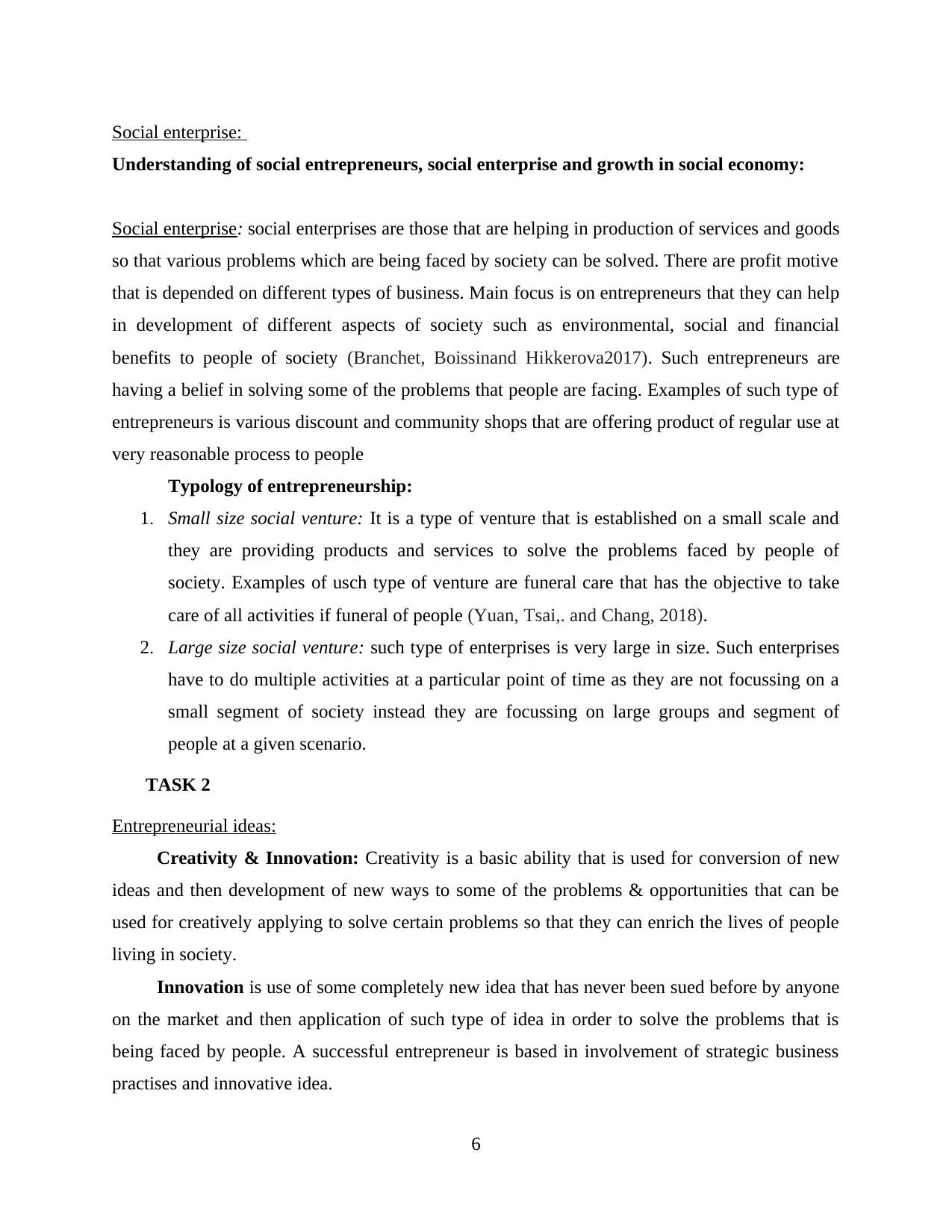
Social enterprise:
Understanding of social entrepreneurs, social enterprise and growth in social economy:
Social enterprise: social enterprises are those that are helping in production of services and goods
so that various problems which are being faced by society can be solved. There are profit motive
that is depended on different types of business. Main focus is on entrepreneurs that they can help
in development of different aspects of society such as environmental, social and financial
benefits to people of society (Branchet, Boissinand Hikkerova2017). Such entrepreneurs are
having a belief in solving some of the problems that people are facing. Examples of such type of
entrepreneurs is various discount and community shops that are offering product of regular use at
very reasonable process to people
Typology of entrepreneurship:
1. Small size social venture: It is a type of venture that is established on a small scale and
they are providing products and services to solve the problems faced by people of
society. Examples of usch type of venture are funeral care that has the objective to take
care of all activities if funeral of people (Yuan, Tsai,. and Chang, 2018).
2. Large size social venture: such type of enterprises is very large in size. Such enterprises
have to do multiple activities at a particular point of time as they are not focussing on a
small segment of society instead they are focussing on large groups and segment of
people at a given scenario.
TASK 2
Entrepreneurial ideas:
Creativity & Innovation: Creativity is a basic ability that is used for conversion of new
ideas and then development of new ways to some of the problems & opportunities that can be
used for creatively applying to solve certain problems so that they can enrich the lives of people
living in society.
Innovation is use of some completely new idea that has never been sued before by anyone
on the market and then application of such type of idea in order to solve the problems that is
being faced by people. A successful entrepreneur is based in involvement of strategic business
practises and innovative idea.
6
Understanding of social entrepreneurs, social enterprise and growth in social economy:
Social enterprise: social enterprises are those that are helping in production of services and goods
so that various problems which are being faced by society can be solved. There are profit motive
that is depended on different types of business. Main focus is on entrepreneurs that they can help
in development of different aspects of society such as environmental, social and financial
benefits to people of society (Branchet, Boissinand Hikkerova2017). Such entrepreneurs are
having a belief in solving some of the problems that people are facing. Examples of such type of
entrepreneurs is various discount and community shops that are offering product of regular use at
very reasonable process to people
Typology of entrepreneurship:
1. Small size social venture: It is a type of venture that is established on a small scale and
they are providing products and services to solve the problems faced by people of
society. Examples of usch type of venture are funeral care that has the objective to take
care of all activities if funeral of people (Yuan, Tsai,. and Chang, 2018).
2. Large size social venture: such type of enterprises is very large in size. Such enterprises
have to do multiple activities at a particular point of time as they are not focussing on a
small segment of society instead they are focussing on large groups and segment of
people at a given scenario.
TASK 2
Entrepreneurial ideas:
Creativity & Innovation: Creativity is a basic ability that is used for conversion of new
ideas and then development of new ways to some of the problems & opportunities that can be
used for creatively applying to solve certain problems so that they can enrich the lives of people
living in society.
Innovation is use of some completely new idea that has never been sued before by anyone
on the market and then application of such type of idea in order to solve the problems that is
being faced by people. A successful entrepreneur is based in involvement of strategic business
practises and innovative idea.
6
Paraphrase This Document
Need a fresh take? Get an instant paraphrase of this document with our AI Paraphraser
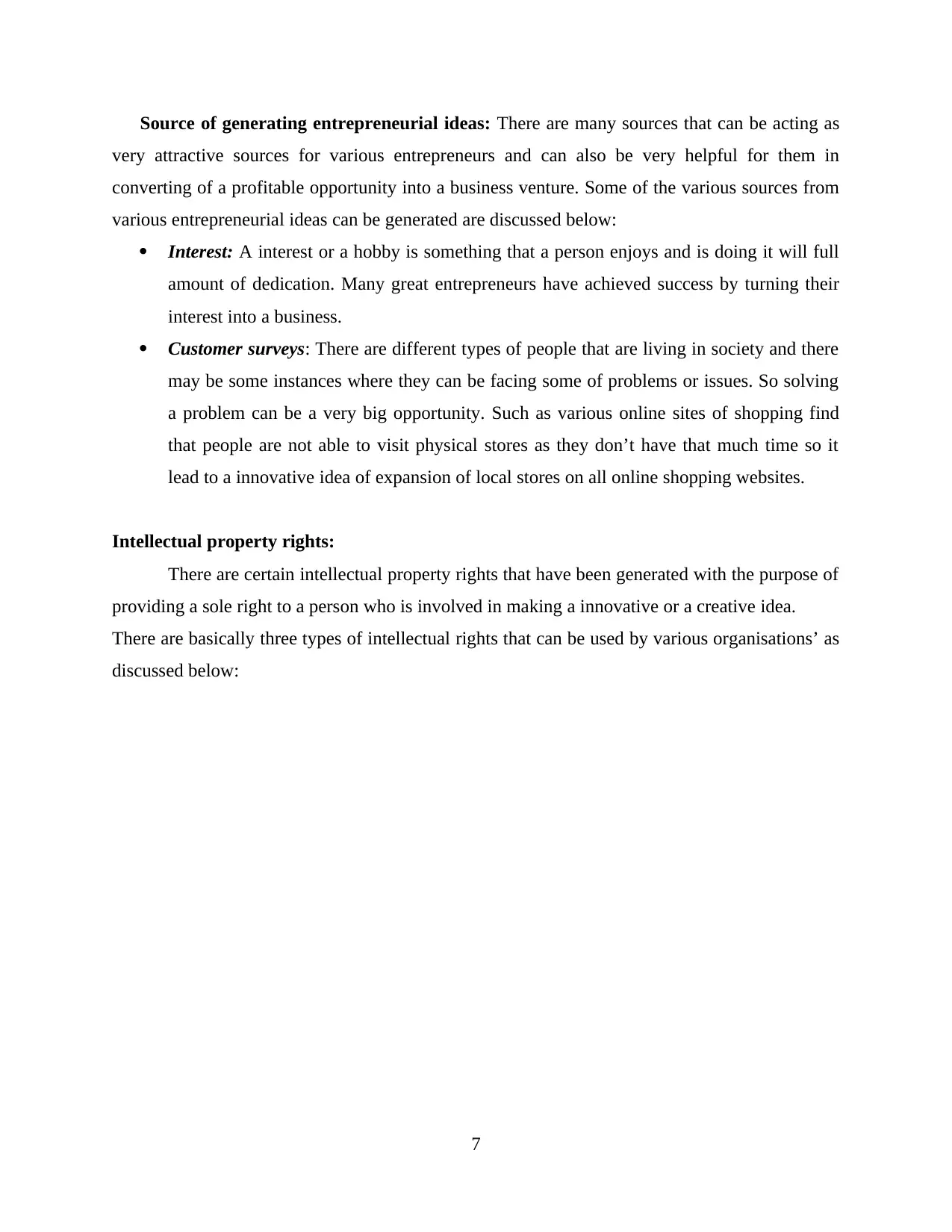
Source of generating entrepreneurial ideas: There are many sources that can be acting as
very attractive sources for various entrepreneurs and can also be very helpful for them in
converting of a profitable opportunity into a business venture. Some of the various sources from
various entrepreneurial ideas can be generated are discussed below:
Interest: A interest or a hobby is something that a person enjoys and is doing it will full
amount of dedication. Many great entrepreneurs have achieved success by turning their
interest into a business.
Customer surveys: There are different types of people that are living in society and there
may be some instances where they can be facing some of problems or issues. So solving
a problem can be a very big opportunity. Such as various online sites of shopping find
that people are not able to visit physical stores as they don’t have that much time so it
lead to a innovative idea of expansion of local stores on all online shopping websites.
Intellectual property rights:
There are certain intellectual property rights that have been generated with the purpose of
providing a sole right to a person who is involved in making a innovative or a creative idea.
There are basically three types of intellectual rights that can be used by various organisations’ as
discussed below:
7
very attractive sources for various entrepreneurs and can also be very helpful for them in
converting of a profitable opportunity into a business venture. Some of the various sources from
various entrepreneurial ideas can be generated are discussed below:
Interest: A interest or a hobby is something that a person enjoys and is doing it will full
amount of dedication. Many great entrepreneurs have achieved success by turning their
interest into a business.
Customer surveys: There are different types of people that are living in society and there
may be some instances where they can be facing some of problems or issues. So solving
a problem can be a very big opportunity. Such as various online sites of shopping find
that people are not able to visit physical stores as they don’t have that much time so it
lead to a innovative idea of expansion of local stores on all online shopping websites.
Intellectual property rights:
There are certain intellectual property rights that have been generated with the purpose of
providing a sole right to a person who is involved in making a innovative or a creative idea.
There are basically three types of intellectual rights that can be used by various organisations’ as
discussed below:
7
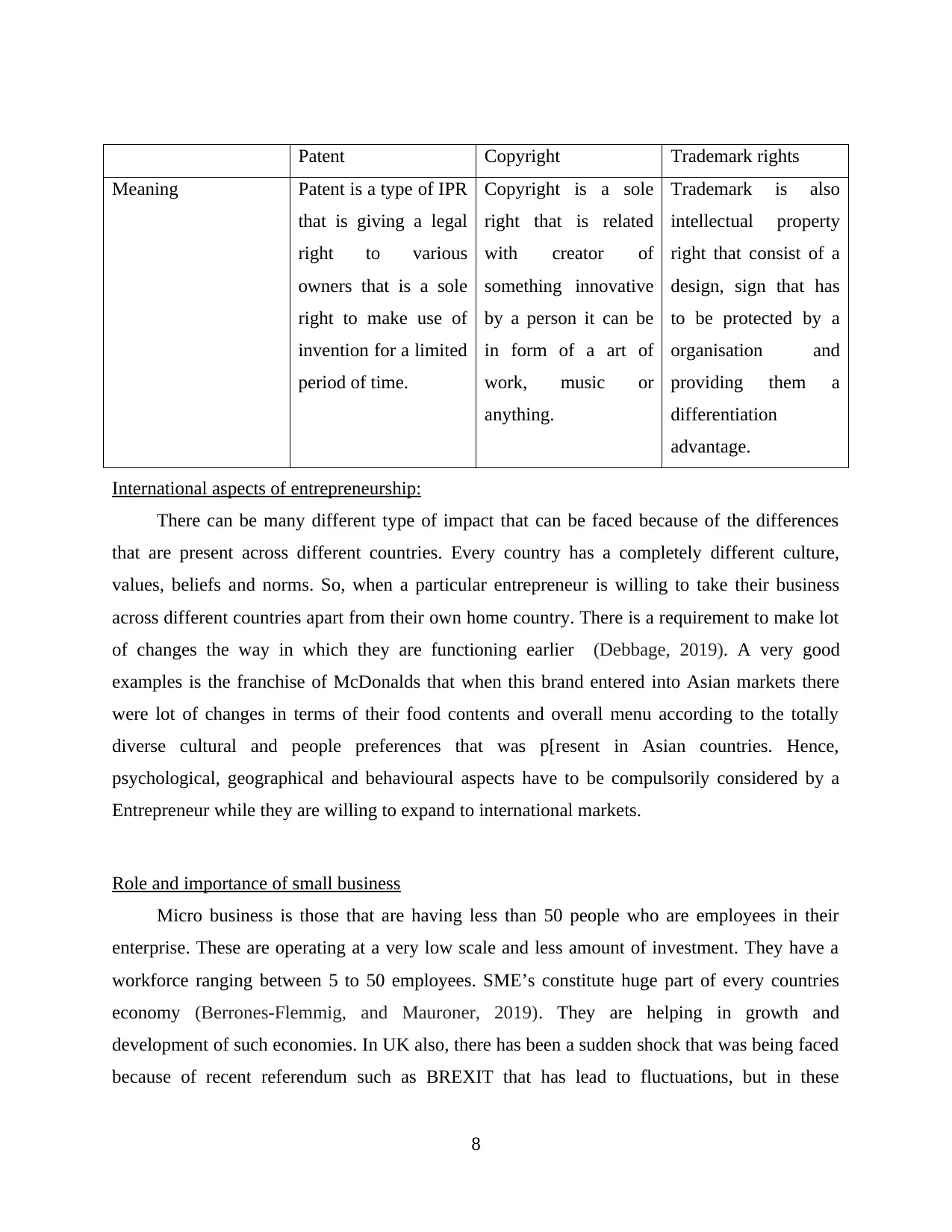
Patent Copyright Trademark rights
Meaning Patent is a type of IPR
that is giving a legal
right to various
owners that is a sole
right to make use of
invention for a limited
period of time.
Copyright is a sole
right that is related
with creator of
something innovative
by a person it can be
in form of a art of
work, music or
anything.
Trademark is also
intellectual property
right that consist of a
design, sign that has
to be protected by a
organisation and
providing them a
differentiation
advantage.
International aspects of entrepreneurship:
There can be many different type of impact that can be faced because of the differences
that are present across different countries. Every country has a completely different culture,
values, beliefs and norms. So, when a particular entrepreneur is willing to take their business
across different countries apart from their own home country. There is a requirement to make lot
of changes the way in which they are functioning earlier (Debbage, 2019). A very good
examples is the franchise of McDonalds that when this brand entered into Asian markets there
were lot of changes in terms of their food contents and overall menu according to the totally
diverse cultural and people preferences that was p[resent in Asian countries. Hence,
psychological, geographical and behavioural aspects have to be compulsorily considered by a
Entrepreneur while they are willing to expand to international markets.
Role and importance of small business
Micro business is those that are having less than 50 people who are employees in their
enterprise. These are operating at a very low scale and less amount of investment. They have a
workforce ranging between 5 to 50 employees. SME’s constitute huge part of every countries
economy (Berrones-Flemmig, and Mauroner, 2019). They are helping in growth and
development of such economies. In UK also, there has been a sudden shock that was being faced
because of recent referendum such as BREXIT that has lead to fluctuations, but in these
8
Meaning Patent is a type of IPR
that is giving a legal
right to various
owners that is a sole
right to make use of
invention for a limited
period of time.
Copyright is a sole
right that is related
with creator of
something innovative
by a person it can be
in form of a art of
work, music or
anything.
Trademark is also
intellectual property
right that consist of a
design, sign that has
to be protected by a
organisation and
providing them a
differentiation
advantage.
International aspects of entrepreneurship:
There can be many different type of impact that can be faced because of the differences
that are present across different countries. Every country has a completely different culture,
values, beliefs and norms. So, when a particular entrepreneur is willing to take their business
across different countries apart from their own home country. There is a requirement to make lot
of changes the way in which they are functioning earlier (Debbage, 2019). A very good
examples is the franchise of McDonalds that when this brand entered into Asian markets there
were lot of changes in terms of their food contents and overall menu according to the totally
diverse cultural and people preferences that was p[resent in Asian countries. Hence,
psychological, geographical and behavioural aspects have to be compulsorily considered by a
Entrepreneur while they are willing to expand to international markets.
Role and importance of small business
Micro business is those that are having less than 50 people who are employees in their
enterprise. These are operating at a very low scale and less amount of investment. They have a
workforce ranging between 5 to 50 employees. SME’s constitute huge part of every countries
economy (Berrones-Flemmig, and Mauroner, 2019). They are helping in growth and
development of such economies. In UK also, there has been a sudden shock that was being faced
because of recent referendum such as BREXIT that has lead to fluctuations, but in these
8
⊘ This is a preview!⊘
Do you want full access?
Subscribe today to unlock all pages.

Trusted by 1+ million students worldwide
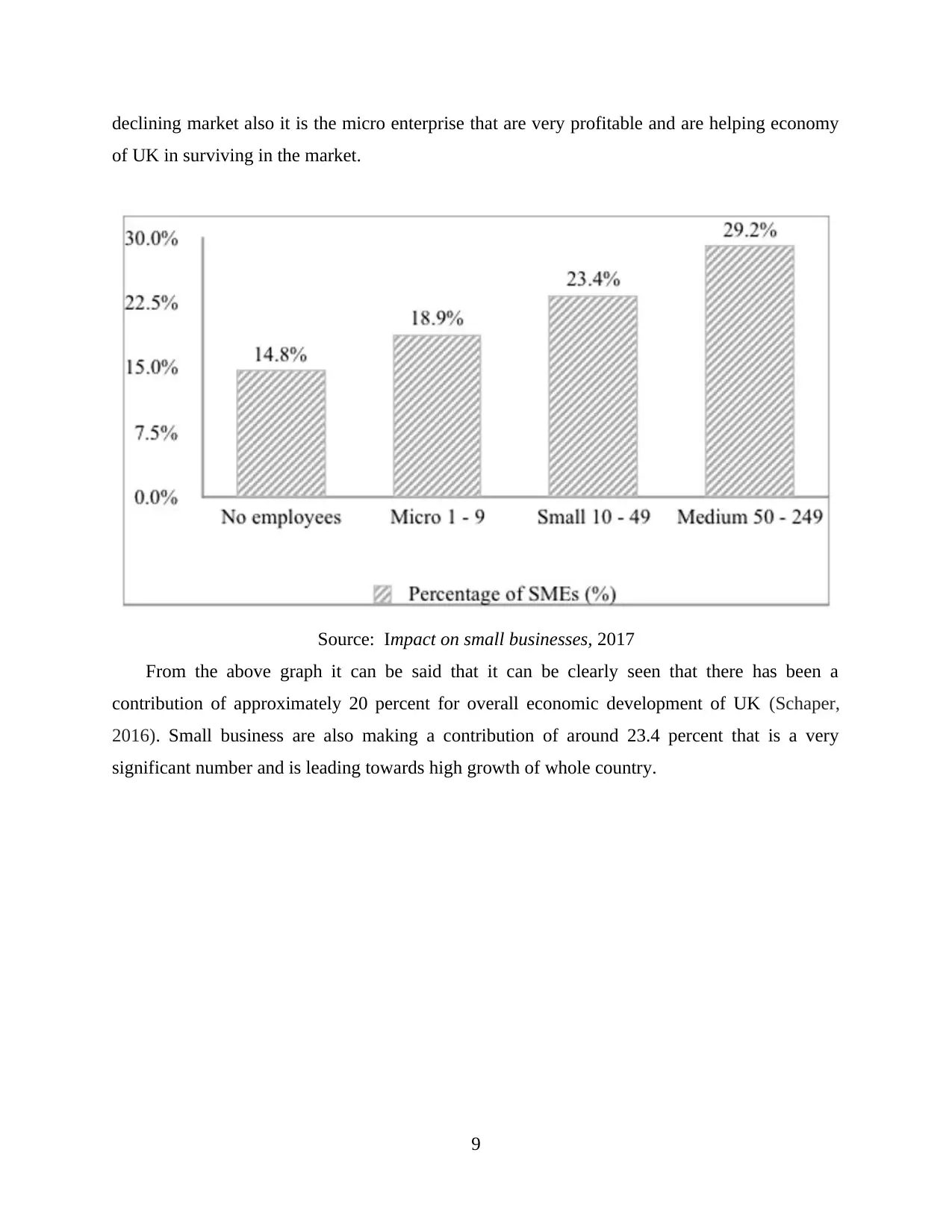
declining market also it is the micro enterprise that are very profitable and are helping economy
of UK in surviving in the market.
Source: Impact on small businesses, 2017
From the above graph it can be said that it can be clearly seen that there has been a
contribution of approximately 20 percent for overall economic development of UK (Schaper,
2016). Small business are also making a contribution of around 23.4 percent that is a very
significant number and is leading towards high growth of whole country.
9
of UK in surviving in the market.
Source: Impact on small businesses, 2017
From the above graph it can be said that it can be clearly seen that there has been a
contribution of approximately 20 percent for overall economic development of UK (Schaper,
2016). Small business are also making a contribution of around 23.4 percent that is a very
significant number and is leading towards high growth of whole country.
9
Paraphrase This Document
Need a fresh take? Get an instant paraphrase of this document with our AI Paraphraser
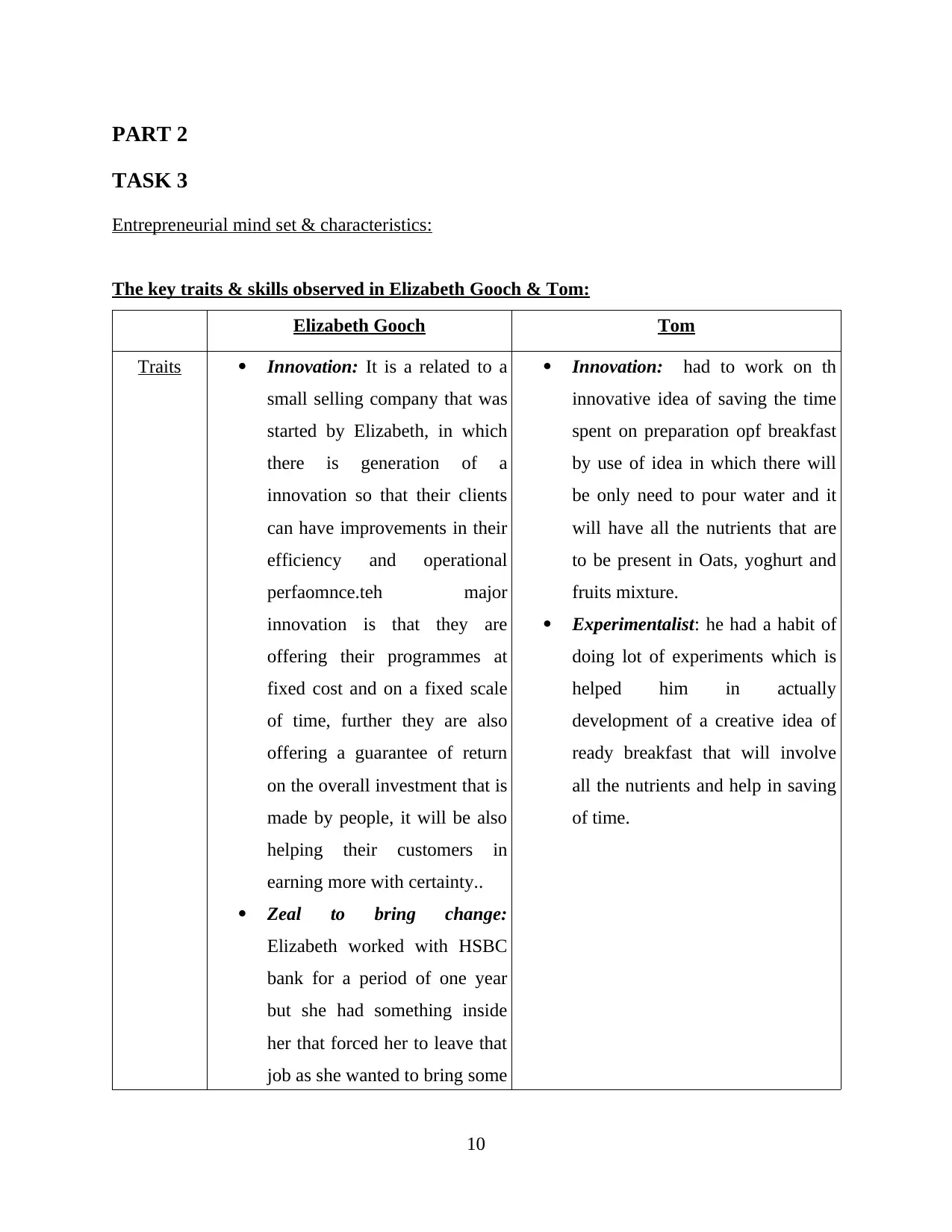
PART 2
TASK 3
Entrepreneurial mind set & characteristics:
The key traits & skills observed in Elizabeth Gooch & Tom:
Elizabeth Gooch Tom
Traits Innovation: It is a related to a
small selling company that was
started by Elizabeth, in which
there is generation of a
innovation so that their clients
can have improvements in their
efficiency and operational
perfaomnce.teh major
innovation is that they are
offering their programmes at
fixed cost and on a fixed scale
of time, further they are also
offering a guarantee of return
on the overall investment that is
made by people, it will be also
helping their customers in
earning more with certainty..
Zeal to bring change:
Elizabeth worked with HSBC
bank for a period of one year
but she had something inside
her that forced her to leave that
job as she wanted to bring some
Innovation: had to work on th
innovative idea of saving the time
spent on preparation opf breakfast
by use of idea in which there will
be only need to pour water and it
will have all the nutrients that are
to be present in Oats, yoghurt and
fruits mixture.
Experimentalist: he had a habit of
doing lot of experiments which is
helped him in actually
development of a creative idea of
ready breakfast that will involve
all the nutrients and help in saving
of time.
10
TASK 3
Entrepreneurial mind set & characteristics:
The key traits & skills observed in Elizabeth Gooch & Tom:
Elizabeth Gooch Tom
Traits Innovation: It is a related to a
small selling company that was
started by Elizabeth, in which
there is generation of a
innovation so that their clients
can have improvements in their
efficiency and operational
perfaomnce.teh major
innovation is that they are
offering their programmes at
fixed cost and on a fixed scale
of time, further they are also
offering a guarantee of return
on the overall investment that is
made by people, it will be also
helping their customers in
earning more with certainty..
Zeal to bring change:
Elizabeth worked with HSBC
bank for a period of one year
but she had something inside
her that forced her to leave that
job as she wanted to bring some
Innovation: had to work on th
innovative idea of saving the time
spent on preparation opf breakfast
by use of idea in which there will
be only need to pour water and it
will have all the nutrients that are
to be present in Oats, yoghurt and
fruits mixture.
Experimentalist: he had a habit of
doing lot of experiments which is
helped him in actually
development of a creative idea of
ready breakfast that will involve
all the nutrients and help in saving
of time.
10
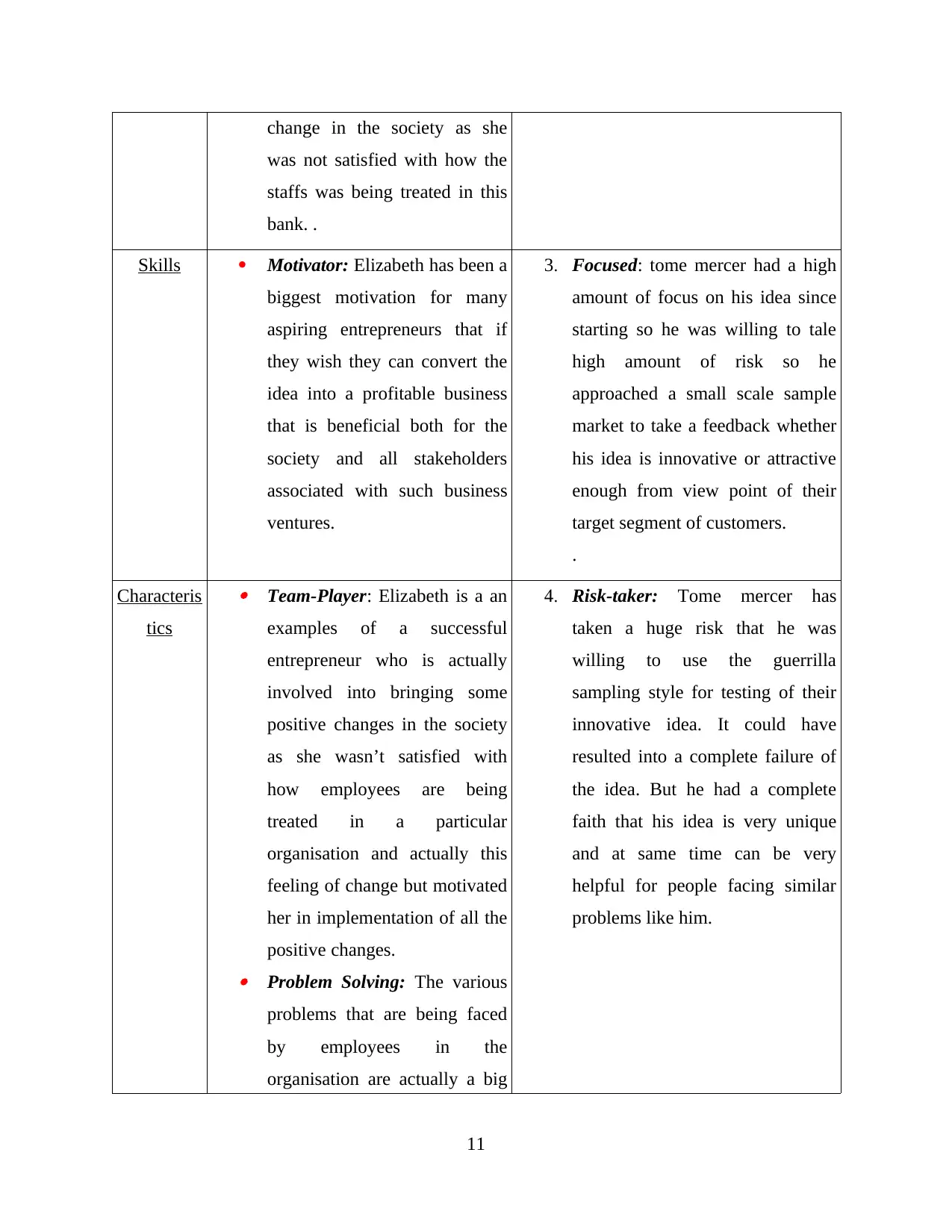
change in the society as she
was not satisfied with how the
staffs was being treated in this
bank. .
Skills Motivator: Elizabeth has been a
biggest motivation for many
aspiring entrepreneurs that if
they wish they can convert the
idea into a profitable business
that is beneficial both for the
society and all stakeholders
associated with such business
ventures.
3. Focused: tome mercer had a high
amount of focus on his idea since
starting so he was willing to tale
high amount of risk so he
approached a small scale sample
market to take a feedback whether
his idea is innovative or attractive
enough from view point of their
target segment of customers.
.
Characteris
tics
Team-Player: Elizabeth is a an
examples of a successful
entrepreneur who is actually
involved into bringing some
positive changes in the society
as she wasn’t satisfied with
how employees are being
treated in a particular
organisation and actually this
feeling of change but motivated
her in implementation of all the
positive changes.
Problem Solving: The various
problems that are being faced
by employees in the
organisation are actually a big
4. Risk-taker: Tome mercer has
taken a huge risk that he was
willing to use the guerrilla
sampling style for testing of their
innovative idea. It could have
resulted into a complete failure of
the idea. But he had a complete
faith that his idea is very unique
and at same time can be very
helpful for people facing similar
problems like him.
11
was not satisfied with how the
staffs was being treated in this
bank. .
Skills Motivator: Elizabeth has been a
biggest motivation for many
aspiring entrepreneurs that if
they wish they can convert the
idea into a profitable business
that is beneficial both for the
society and all stakeholders
associated with such business
ventures.
3. Focused: tome mercer had a high
amount of focus on his idea since
starting so he was willing to tale
high amount of risk so he
approached a small scale sample
market to take a feedback whether
his idea is innovative or attractive
enough from view point of their
target segment of customers.
.
Characteris
tics
Team-Player: Elizabeth is a an
examples of a successful
entrepreneur who is actually
involved into bringing some
positive changes in the society
as she wasn’t satisfied with
how employees are being
treated in a particular
organisation and actually this
feeling of change but motivated
her in implementation of all the
positive changes.
Problem Solving: The various
problems that are being faced
by employees in the
organisation are actually a big
4. Risk-taker: Tome mercer has
taken a huge risk that he was
willing to use the guerrilla
sampling style for testing of their
innovative idea. It could have
resulted into a complete failure of
the idea. But he had a complete
faith that his idea is very unique
and at same time can be very
helpful for people facing similar
problems like him.
11
⊘ This is a preview!⊘
Do you want full access?
Subscribe today to unlock all pages.

Trusted by 1+ million students worldwide
1 out of 17
Related Documents
Your All-in-One AI-Powered Toolkit for Academic Success.
+13062052269
info@desklib.com
Available 24*7 on WhatsApp / Email
![[object Object]](/_next/static/media/star-bottom.7253800d.svg)
Unlock your academic potential
Copyright © 2020–2026 A2Z Services. All Rights Reserved. Developed and managed by ZUCOL.




